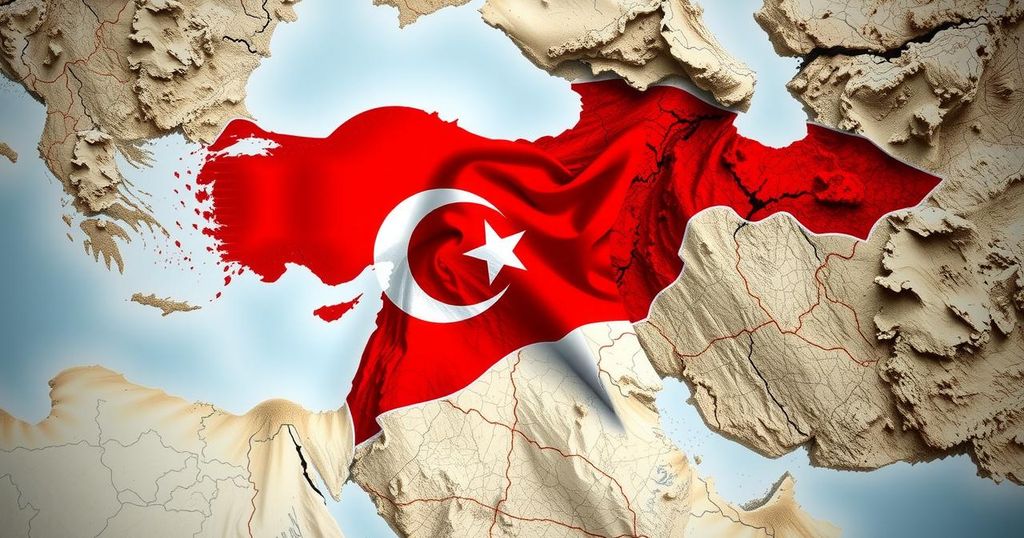The Middle East is experiencing a power shift with Turkey emerging as a leading force following the decline of Iran’s influence, mainly due to the fall of Assad in Syria. Turkey’s consistent support for Syrian rebels and its active role in regional diplomacy have positioned it as a key player, reshaping alliances particularly in Iraq and challenging traditional powers like Saudi Arabia.
The geopolitical landscape of the Middle East is witnessing a significant transformation, epitomized by the decline of Iran’s influence following the fall of the Assad regime in Syria and the concurrent rise of Turkey as a powerful regional entity. Turkey, under the leadership of President Recep Tayyip Erdoğan, has emerged as an indispensable player by steadfastly supporting Syrian rebels, thereby enhancing Ankara’s stature in the region.
Turkey has played a critical role in facilitating the rebels’ success, characterized by a comparatively low level of violence in this latest phase of the Syrian conflict. The nation’s unwavering assistance has manifested in intelligence sharing, strategic guidance, and political backing, which has been crucial for the rebels’ stability since 2019 amid fluctuating ceasefires. This has enabled the opposition forces to regroup and strengthen their capabilities against the Assad regime.
As Iran’s resources have dwindled, largely due to Israeli military operations against Hezbollah and Iranian entities in Syria and Lebanon, the collapse of Assad’s regime has transitioned from a distant possibility to an imminent reality. Simultaneously, Russia’s focus on its aggression in Ukraine has limited its support for Assad, further undermining Iran’s strategic objectives.
Turkey’s influence is expected to reverberate throughout the region, particularly in Iraq. The emergence of a Sunni-led government in Syria dynamically alters Turkey’s interactions with predominantly Sunni regions in Iraq, many of which have been dominated by Iranian-backed Shia militias post the Islamic State’s defeat. This gradual attenuation of Iranian power in Iraq appears to be following a similar trajectory already observable in Syria.
Turkey’s aspirations extend well beyond its immediate neighbors. Erdoğan’s mediation of a recent agreement between Somalia and Ethiopia highlights Ankara’s active engagement in regional diplomacy, reflecting Turkey’s efforts to solidify its diplomatic and military presence in Africa and the Caucasus. This involvement also encompasses military assistance to the legitimate Libyan government and close cooperation with Azerbaijan in the wake of conflict with Armenia, consolidating its influence in the South Caucasus.
The shifting power dynamics have introduced additional challenges for Saudi Arabia and its allies. Unlike Iran, which is easily identifiable as a rival through its sectarian Shia identity, Turkey presents a subtler challenge as a Sunni powerhouse with significant political clout. Tehran’s longstanding ambition to assert dominance over the Middle East is jeopardized by Turkey’s expanding reach, particularly as Ankara’s secular governance and Islamist inclinations resonate with Sunni populations across the region.
Following two decades of Iran’s aggressive expansion, symbolized by its so-called Shia crescent, the fall of Assad signifies a potential fracturing of this corridor, which has historically enabled Iran to undermine adversaries through regional proxies. Turkey’s ascendancy not only threatens Iran’s land connectivity to Lebanon but also positions Damascus as a possible new ally, thereby reshaping the regional alliances.
Turkey’s burgeoning influence is attributable to its distinct foreign policy approach, boldly operating on economic and security fronts while actively engaging in military interventions. Unlike Iran, which has relied heavily on proxy warfare and sectarian strategies, Turkey combines military readiness with diplomatic outreach, fostering relationships that transcend sectarian divides.
The rise of Turkey as a pivotal force raises alarm bells among GCC states, particularly Saudi Arabia and the UAE, prompting a reevaluation of their regional alliances and strategies. Western perceptions of Turkey are also mixed, oscillating between unease over its Islamist connections and acknowledgment of its growing role in Middle Eastern geopolitics.
In conclusion, the Middle East’s future geopolitical disputes are likely to be shaped by Turkey’s ambitions, marking a departure from previous contests centered on Iranian interests to a more complex arena where Turkey’s role will be increasingly scrutinized. The question is not whether Turkey will dominate the region, but rather how its influence will unfold in the years to come.
The article discusses the shifting balance of power in the Middle East, prominently featuring Turkey’s ascendance as a geopolitical force. As Iran’s influence dwindles, particularly following changes in Syria and Iraq, Turkey has successfully positioned itself as an alternative Sunni power broker. The context includes historical struggles for dominance in the region, the role of key players like Iran, Turkey, and Saudi Arabia, and the implications of evolving alliances for future stability in the Middle East.
In summary, Turkey’s rise as a regional power is transforming the Middle Eastern geopolitical landscape, particularly in light of Iran’s declining influence. The Syrian rebel victory, underpinned by Turkey’s robust support, reshapes alliances in Iraq, shifts the balance of power, and poses new challenges to rival states like Saudi Arabia. The implications of Turkey’s assertive foreign policy strategies underscore an impending era of competition centered around its ambitions, warranting keen observation from regional and global actors.
Original Source: www.theguardian.com






